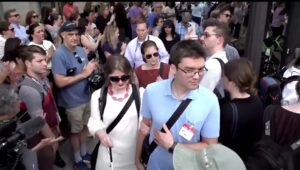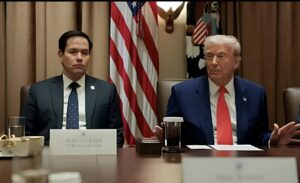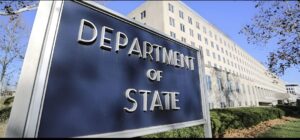One employee coordinated critical intelligence operations. Another focused on advancing U.S. energy interests overseas. A third specialized in strategic competition with China.
These employees represent just a portion of the more than 1,300 State Department staffers who were let go last week—cuts that wiped out centuries of collective institutional knowledge and diplomatic expertise.
The sweeping dismissals have sent shockwaves through the U.S. diplomatic corps. For many, the layoffs not only mark a sudden end to long-standing careers but also raise urgent questions about who—if anyone—will take over what they describe as essential work for maintaining national security and global competitiveness.
Many of the abolished roles and offices directly align with priorities President Donald Trump has emphasized for his second term, including cracking down on visa fraud and confronting China’s growing influence. Other cuts, such as those affecting passport processing, are likely to have immediate and tangible impacts on everyday Americans.
Officials in the Trump administration have defended the restructuring, describing the mass firings as long overdue. They argue the changes are necessary to streamline the department and improve efficiency.
Where the State Department Cuts Are Hitting

Among those affected by the recent layoffs are over 100 employees from the Bureau of Consular Affairs a division that operates independently of taxpayer funding, relying instead on passport and visa fees.
According to a list compiled by current and former foreign service officers and submitted to Congress this week, the cuts include half of a specialized team that investigates passport fraud, as well as 23 staff members who managed contracts for American citizen services. These services range from passport processing to support for U.S. citizens both domestically and overseas.
Additional layoffs targeted subject matter experts tasked with addressing visa fraud and money laundering operations in Russia and Eastern Europe. Others worked on combating transnational criminal networks and fraudulent migrant worker visa schemes in Mexico and Central America.
A small team within the Bureau of East Asian and Pacific Affairs known for handling multilateral engagements and recently supporting Senator Rubio’s trip to Malaysia was dismissed while Rubio was en route back to Washington from Kuala Lumpur, according to internal documentation.
Several employees reported that their office, which focused on immigration—an area the administration had identified as a priority—was abruptly disbanded. Many believed their roles were secure, with some even on vacation when layoff notices began arriving.
“It was completely unexpected. There’s nobody left doing the work we were doing,” said one laid-off employee with over three decades of experience.
In interviews with The Associated Press, more than six affected staff members emphasized the importance of their duties. Some had received tens of thousands of dollars in government investment for language training, job relocation, and overseas assignments. They requested anonymity, fearing retaliation from the Department, as they remain on payroll until September.
“The American people aren’t being told the full story about what’s happening inside the Department,” said a civil service intelligence officer who was recently dismissed. According to this individual, their intelligence work has been reassigned to a department unequipped to handle the sensitive material and coordination previously required.
One senior official, fired after 26 years in the foreign service, said their office had been leading efforts to sustain U.S. energy leadership abroad. At his confirmation hearing earlier this year, Rubio emphasized that energy policy would be “a centerpiece of our foreign policy.”
“The fact that all the energy experts promoting overseas oil and gas sales were let go completely undermines that claim,” the official said.
Additionally, at least seven intelligence analysts specializing in Russia and Ukraine, and five fluent Chinese speakers, were among those dismissed, according to two of the employees.
A staffer focused on strategic competition with China expressed alarm at the loss of personnel with deep institutional knowledge and language skills, warning that such decisions could weaken U.S. positioning. This comes despite Rubio’s recent comments identifying China as “the most significant long-term risk to the United States.”
While the dismissals were less extensive than some anticipated, they have raised serious concerns across the Department. Remaining staff are now burdened with extra duties in critical areas such as intelligence and research, consular services, diplomatic security, energy, and international organizations.

Facing skeptical Democratic lawmakers, Michael Rigas—the State Department official who issued the layoff notices—sought to reassure Congress that the cuts wouldn’t compromise U.S. diplomacy. Rigas denied that the layoffs were reckless or posed a threat to national security.
Appearing before the Senate Foreign Relations Committee, Rigas argued that the State Department, with over 76,000 employees globally, had become unwieldy and in need of a major reorganization to remain effective and responsive to global challenges.
“The department grew too large and lost its direction,” said spokesperson Tammy Bruce. She clarified that the issue stemmed not from the employees themselves, but from structural inefficiencies.
According to Rigas, those laid off are on administrative leave—foreign service officers for 120 days, and civil servants for 20—and may reapply for jobs once the government’s hiring freeze is lifted.

However, tensions escalated during the hearing when Senator Cory Booker (D-NJ) accused Rigas of misleading Congress about the scope of the cuts. Holding up a list of alleged inaccuracies in Rigas’ earlier House testimony, Booker challenged his credibility.
“I don’t trust you, Mr. Rigas,” Booker said. “Your statements lack veracity.”
“This is outrageous,” Rigas shot back, trying to speak over interruptions.
Booker’s accusations echoed claims from current and former foreign service officers, who said Rigas had downplayed or misrepresented which positions were being eliminated.

